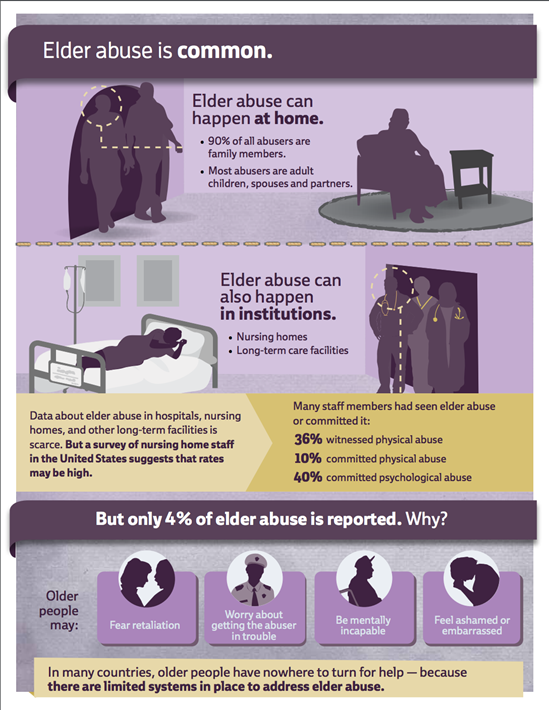Abuse of older people
The abuse of older people, also known as elder abuse, is an intentional act, or failure to act, by a caregiver or another person in a relationship involving an expectation of trust that causes harm to an adult 60 years and older. Around 1 in 6 people 60 years and older experienced some form of abuse in community settings during the past year. Rates in institutional settings, such as nursing homes and long-term care facilities, are higher still, with 2 in 3 staff reporting that they have committed abuse in the past year. Even if rates remain constant, the absolute number of older people experiencing abuse is predicted to increase as the global population of older people increases. Abuse of older people can lead to serious physical injuries and long-term psychological consequences, increased risk of nursing home placement, use of emergency services, hospitalization and premature death.
Promising strategies to prevent and respond to abuse of older people include caregiver interventions, which provide services to relieve the burden of caregiving; money management programmes for older adults vulnerable to financial exploitation; helplines and emergency shelters; and multi-disciplinary teams, as the responses required often cut across many systems, including, for instance, criminal justice, health care, mental health care, adults protective services and long-term care.
Many strategies have been implemented to prevent abuse of older people, take action against it and mitigate its consequences. Interventions that have been implemented – mainly in high-income countries – to prevent abuse include:
- public and professional awareness campaigns
- screening (of potential victims and abusers)
- school-based intergenerational programmes
- caregiver support interventions (including stress management and respite care)
- residential care policies to define and improve standards of care
- caregiver training on dementia
- money management programmes
- multidisciplinary teams.
Efforts to respond to and prevent further abuse include interventions such as:
- mandatory reporting of abuse to authorities
- self-help groups
- safe-houses and emergency shelters
- psychological programmes for abusers
- helplines to provide information and referrals
- caregiver support interventions.
On 15 June 2022, World Elder Abuse Awareness Day, WHO and partners published “Tackling abuse of older people: five priorities for the UN Decade of Healthy Ageing (2021–2030)”. The United Nations Decade of Healthy Ageing 2021–2030 is a unique chance for a step change in the way abuse of older people is tackled.
It offers an opportunity to address abuse of older people in a more concerted, sustained and coordinated way and to reduce the number of older people worldwide who experience abuse. This document outlines five priorities, arrived at through wide consultation,
to prevent and respond to abuse of older people, which are:
- combatting ageism;
- generating more and better data on prevalence and risk and on protective factors;
- developing and scaling up cost–effective solutions for abuse of older people;
- making an investment case for addressing the issue; and
- raising funds for tackling abuse of older people.
WHO’s response to abuse of older people will also be organized according to these five priorities. If governments, UN agencies and development organizations, civil society organizations, academic and research institutions and funders implement these priorities we can finally start to prevent abuse of older people globally and contribute to improving their health, well-being and dignity.









